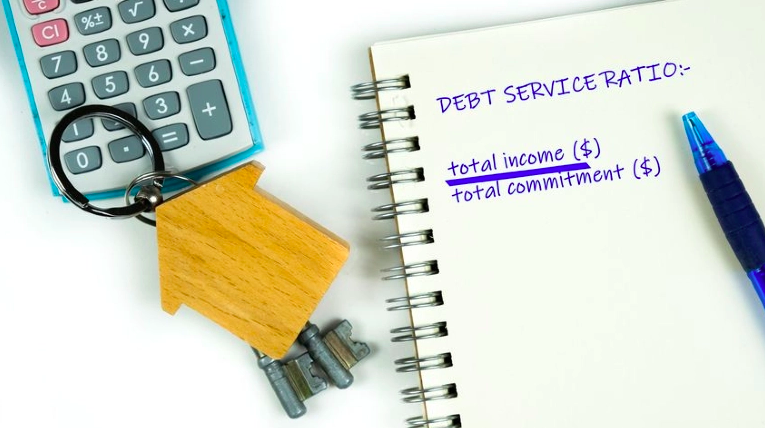Looking for a housing loan that will help you buy that dream home? You're going to need to get a favourable Debt Service Ratio (DSR) first. Find out more about what this is, and why it's so important, below!
“Time to shop for a new home!” you say, as your family and friends congratulate you on this milestone (while secretly hoping that you’d invite them for the housewarming party, so they can evaluate your choices).
Wait, not so fast! What not many people know is that BEFORE you can begin property hunting, you need to shop around for the right housing loan too.
To put it simply: Find out your affordability, which is the amount of money the bank will approve you for = Knowing the price range that you should be looking at.
But it’s not as simple as you think; walking into any bank you like, filling all the necessary paperwork, and then you instantly get the money you need.
Banks take many factors into account when they’re considering each application, such as the individual’s credit score like CCRIS and CTOS, and the Debt Service Ratio (DSR).
While the former is straightforward enough, as it merely involves approaching the respective parties to generate a factual report for you, the latter is a whole other complicated process.
For starters, there’s a basic calculation involved, where the formula goes like this:

When you get your DSR (in a percentage form), the general rule of thumb is that it should be lower than 70%. Sounds easy right, especially if you get a DSR of 60%?
NOPE.
You can still receive the bad news that your housing loan has been rejected, as different banks have their own set of requirements when it comes to evaluating each loan applicant.
If you’re starting to become confused at this point, we’ve got you covered! Below, you’ll find some of the common questions that Malaysians have asked, with financial expert Travis Tiu on board to answer them all.
1) What is the general rule of thumb for the ideal DSR score (if any)?
If we were to generalise what is the ‘best/healthy’ DSR percentage where it would be accepted by most of the banks, 70% is what people should be aiming for.
However, having your DSR within the bank's guidelines isn’t the only thing to watch out for. You should also be paying attention to your monthly income level.
Did you know that banks will reserve RM1,000 to RM1,200 from the individual’s income for daily expenses, BEFORE actually carrying out the calculations?
So, if your income is anywhere less than RM3,000, you might face more difficulties in getting a favourable DSR calculation, compared to someone else earning twice the amount of yours.
What this means is, a lot of banks are imposing a lower DSR (approximately 60%) for certain income brackets – namely those earning less than RM3,000.
For example, you earn RM2,800 a month, so a DSR of 70% should mean RM1,960 for the loan amount. Right? Yet, that isn’t the case, since RM2,800 – RM1,100 (daily expenses) = RM1,700.
So, [(RM1,700/RM2,800)*100%] = That’s only a 61% DSR. Instead of the 70% DSR that you originally thought you’d be approved for, you're getting much less.
While there are certain cases where the DSR could be as high as 90 or 100%, it’s the borrower’s financial profile which certainly makes a huge difference.
Usually, this category belongs to high-income earners and high net-worth clients. These people will generally hold higher positions, have better financial management, and possess extensive savings.
2) Do Malaysian banks only lend up to 70% of DSR most of the time?
The DSR varies widely from one bank to another. Even within the same bank, there could be different guidelines on what is the borrower’s DSR percentage that’s allowed.
Malaysian banks will usually have an acceptable DSR that’s (roughly) in the range of 60% up to 100%, again dependable on a lot of factors, such as:
- Income bracket
- The ratio of income put towards commitments
- Internal bank scoring and risk grades
- Intended property is for own stay or investment purposes
3) What does each of the factors (that influence an individual’s DSR limit with the bank) mean?
The main factor that will directly have an impact is your monthly income. A lower-income vs. a significantly higher income will have a huge difference, in terms of leftover money (after deducting for all basic expenses and debt repayments).
Say, there’s a person who’s earning RM10,000 a month with a DSR of 70%; he/she will be left with RM3,000. Now, compare this with a person earning RM3,000 a month with a DSR of 70%; he/she will only be left with RM900.
In this case, the bank would allow the person earning more to enjoy a higher gearing, versus the lower-income earner (given the need to spend on daily expenses).
Scoring or risk grade also plays a role, whereby each bank has their own internal scoring system, where they will generate a rating for every client, based on their background.
It's a way to grade an individual, so a better scoring or a person with a lower risk grade would eventually be entitled to a higher DSR, compared to a person that possesses a higher risk.
Even the type of financing would somewhat affect your DSR allowable! Most of the banks allow the purchase of a property (whether it’s brand new or subsale) to have a higher gearing, compared to a person who’s looking to refinance (especially with cash out).
This is because of the risks posed when a person is not only wanting to switch on their loan, but they're cashing out on their properties.
4) Is it true there are different calculation methods used by each bank in Malaysia? What are some examples of the most common calculation methods used?
Most of the banks would have their own method of calculating the income part of the calculation (refer to the formula provided above!).
It's general knowledge that they prefer using net income as a parameter, while only a certain few are using gross income.
Those who use the gross income to calculate usually have a lower gearing ratio, to mitigate the portion of income that’s not able to be used to service all their existing and new loans.
Let's take a look at 2 different types of income that an individual may have:
- Fixed income; such monthly salary, and rental income: This will be calculated using the net income method, and is usually taken as a combined sum over a period of 3 months. Now, for this, each bank would have a different acceptable DSR range, from 70% up to 100%.
- Variable income; such as commission, overtime, and allowances: Again, most banks will calculate this using the net income method, and is usually taken as a combined sum over a period of 6 months. However, for this, each bank would have a different acceptable DSR range, from 50% to 100%.
All banks have their own set of calculations that are applied differently, based on how much each respective institution is willing to recognise.
The calculation of your commitments (read: current debts; nothing to do with your relationships!) will be different for most of the banks too, resulting in you having a different (and sometimes inaccurate) DSR from one bank to another.
Let’s say that a borrower has an existing hire purchase loan with a tenure of 9 years and an interest rate of 3%.
But their bank might just have their own guidelines of calculating the commitment from the hire purchase loan, say 7 years for 3.5%.
The total amount at the end could eventually be higher than what the borrower is paying, thus causing the DSR rate to be inaccurate!
The same thing applies to credit cards. Let's say you own 5, but only 1 of them has a small debt amount on it of RM1,000.
Some financial institutions will calculate that type of commitment as 5% of the outstanding amount. Sounds pretty straightforward, right?
However, even if all 5 of your credit cards have been paid off in full, some banks will still calculate 1% of the total limit of the amount on all 5 cards!
5) How do banks decide on their respective maximum allowable DSR limit/threshold, i.e. is there a standard credit guideline that they need to follow?
Yes, every bank would have a table of maximum allowable DSR that has to be followed, and most of the time, it’s the potential borrower’s income that determines which category of DSR % that they fall into.
To get beyond the bank’s guidelines, that would require a person’s net worth to be as high as possible (e.g. a person with RM1 million in their savings and assets).
These are considered high net worth customers and would be eligible for a higher DSR % (in certain banks up to 100%).
Banks would prefer liquid assets more than fixed assets, while some banks only consider liquid assets as a measurement for high net worth.
They would see this type of customer as having much more capability to overcome tough times like an economic downturn, therefore reducing the risk of the loan being defaulted on.
6) Is there any other way to be able to receive a higher DSR, without increasing net worth?
There are banks out there that grant their existing clients the ability to borrow a loan even when the DSR has breached the standard guidelines, given having a good repayment record with the bank for a certain period.
So, you should have a good and stable relationship with more banks, than having a lot of facilities with just one preferred bank.
Now, to obtain a lower DSR percentage allowable, there are a few things that you could do:
a) Reduce credit card usage before getting a loan.
Assuming it’s a person with an RM10,000 credit card balance, most banks' calculations would take 5% of that commitment, which would work out to be RM500.
Okay, picture this instead: A typical housing loan of RM110,000 and 30 years tenure with the current interest rate of 3.60% would compute to a monthly instalment of RM500.
To put it simply: If you can settle that credit card balance of RM10,000, it would improve your DSR %.
Which means that instead of only getting an RM300,000 loan, for example, you can qualify for a housing loan of RM300,000 + RM110,000 = RM440,000!
Any credit card settlement should be done one month before a loan application, as CCRIS updates its reports every month, and not immediately after payment is made.
b) Settle small outstanding loans.
If there are small loans that you are left with which only have a few instalments, consider settling it off, IF it is within your financial capabilities.
If not, your bank will still take the full instalment amount into the calculation, even though there are only 1-2 months left on that particular loan!
c) Always keep all the letter of offer or loan agreement that reflects the actual loan instalment.
Certain banks are allowed to use the actual letter of offer’s instalment amount to calculate as the actual commitment, instead of using the bank’s method, which might turn out to be higher than it is.
d) Keep all records of side income that may boost up income calculation.
If you have any part-time income such as direct selling, insurance, or be it a personal tutor, remember to keep hold of the official slip/paper! You can also always use your bank statement as proof of payment received.
If none of those is available, then make sure the income is reported in your yearly tax assessment. Any additional income will eventually bring down the DSR.
e) Keep records of the payslip when your company makes bonus payments.
For this, make sure to save your payslips for two consecutive years, as well as the bank statements, to show proof of payment.
EA forms are also an acceptable type of documentation for certain banks too. Having this will increase your income calculation.
7) Here are some sample scenarios of how banks would decide for a housing loan approval
a) If you have 5 years of work experience and earn less than RM5k a month
Most of the banks tend to favour an employee with a fixed income and someone who has been working for more than a year.
However, if your age is too young (below 25), there might be a chance that the bank will ask for the parents to come in as a joint applicant.
b) If you don't have a fixed income stream
When a person is earning a commission income or doing freelance work, the documentation of income is very important.
Any payment should be recorded by payment voucher or commission statement, and always keep a proof of record, which is the bank statement.
One of the banks which is more favourable to take 100% of an individual’s variable income, is Hong Leong Bank.
c) If you want to apply for a joint home loan
All banks do allow you to apply for a joint home loan, there’s not much difference between one bank's DSR to another.
d) If you are looking for the best Islamic financing package
Most of the Islamic packages are similar, in terms of products offered, due to the Syariah rules that apply.
e) If you’re a foreigner
In terms of a foreigner, we have to separate it into two categories: Singaporean and non-Singaporean.
For Singaporeans, most of the banks in Malaysia are allowed to grant them up to 80% of the loan amount.
While for non-Singaporeans, it’ll usually be 50% to 60% of the loan’s margin, while Standard Chartered tends to offer a higher loan amount (which could be up to 70% to 80%, depending on the nationality).
f) If you’re a Malaysian working and living overseas
For foreign income, most banks can offer a housing loan of up to 80%.
g) If you want to refinance
For refinancing, the best method is to look for a bank that can give the highest, in terms of your property valuation.
Maybank & RHB would have much more options of professional valuers that may get a higher value for your property that you intend to get it refinanced.
In this case, if you wish to cash out by refinancing, you stand a higher chance of getting more from this process.
This article was originally published and contributed by PropertyGuru.
.jpeg)




















.jpeg)
